54 start with O start with O
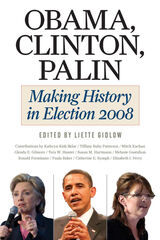
Election 2008 made American history, but it was also the product of American history. Barack Obama, Hillary Clinton, and Sarah Palin smashed through some of the most enduring barriers to high political office, but their exceptional candidacies did not come out of nowhere. In these timely and accessible essays, a distinguished group of historians explores how the candidates both challenged and reinforced historic stereotypes of race and sex while echoing familiar themes in American politics and exploiting new digital technologies.
Contributors include Kathryn Kish Sklar on Clinton’s gender masquerade; Tiffany Ruby Patterson on the politics of black anger; Mitch Kachun on Michelle Obama and stereotypes about black women’s bodies; Glenda E. Gilmore on black women’s century of effort to expand political opportunities for African Americans; Tera W. Hunter on the lost legacy of Shirley Chisholm; Susan M. Hartmann on why the U.S. has not yet followed western democracies in electing a female head of state; Melanie Gustafson on Palin and the political traditions of the American West; Ronald Formisano on the populist resurgence in 2008; Paula Baker on how digital technologies threaten the secret ballot; Catherine E. Rymph on Palin’s distinctive brand of political feminism; and Elisabeth I. Perry on the new look of American leadership.

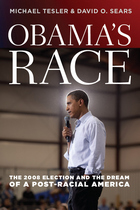
Barack Obama’s presidential victory naturally led people to believe that the United States might finally be moving into a post-racial era. Obama’s Race—and its eye-opening account of the role played by race in the election—paints a dramatically different picture.
The authors argue that the 2008 election was more polarized by racial attitudes than any other presidential election on record—and perhaps more significantly, that there were two sides to this racialization: resentful opposition to and racially liberal support for Obama. As Obama’s campaign was given a boost in the primaries from racial liberals that extended well beyond that usually offered to ideologically similar white candidates, Hillary Clinton lost much of her longstanding support and instead became the preferred candidate of Democratic racial conservatives. Time and again, voters’ racial predispositions trumped their ideological preferences as John McCain—seldom described as conservative in matters of race—became the darling of racial conservatives from both parties. Hard-hitting and sure to be controversial, Obama’s Race will be both praised and criticized—but certainly not ignored.

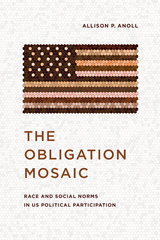
In The Obligation Mosaic, Allison P. Anoll shows that the obligations that bring people into the political world—or encourage them to stay away—vary systematically by race in the United States, with broad consequences for representation. Drawing on a rich mix of interviews, surveys, and experiments with Asian, Black, Latino, and White Americans, the book uncovers two common norms that centrally define concepts of obligation: honoring ancestors and helping those in need. Whether these norms lead different groups to politics depends on distinct racial histories and continued patterns of segregation.
Anoll’s findings not only help to explain patterns of participation but also provide a window into opportunities for change, suggesting how activists and parties might better mobilize marginalized citizens.
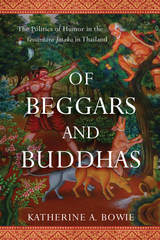
The Vessantara Jataka has served both monastic and royal interests, encouraging parents to give their sons to religious orders and intimating that kings are future Buddhas. But, as Bowie shows, characterizations of the beggar Jujaka in various regions and eras have also brought ribald humor and sly antiroyalist themes to the story. Historically, these subversive performances appealed to popular audiences even as they worried the conservative Bangkok court. The monarchy sporadically sought to suppress the comedic recitations. As Thailand has changed from a feudal to a capitalist society, this famous story about giving away possessions is paradoxically being employed to promote tourism and wealth.
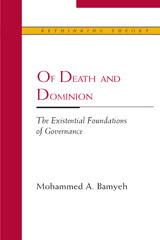
Death is the opposite not of life, but of power. And as such, Mohammed Bamyeh argues in this original work, death has had a great and largely unexplored impact on the thinking of governance throughout history, right down to our day. In Of Death and Dominion Bamyeh pursues the idea that a deep concern with death is, in fact, the basis of the ideological foundations of all political systems.
Concentrating on four types of political systems—polis, empire, theocracy, and modern mass society systems—Bamyeh shows how each follows a specific strategy designed to pit power against the equalizing specter of death. Each of these strategies—consolation, expansion, preparation, and repression—produces a certain style of political behavior, as well as particular psychic traumas. In making his argument, Bamyeh revisits a wide range of empirical and theoretical discussions in existentialist philosophy, psychoanalysis, comparative historical sociology, literary studies, and anthropology. By demonstrating how schemes of power are by definition also schemes for defying death—despite their claims to the contrary—his book encourages us to think of a new style of politics, one oriented toward life.
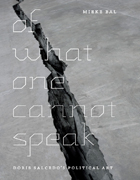
Doris Salcedo, a Colombian-born artist, addresses the politics of memory and forgetting in work that embraces fraught situations in dangerous places. Noted critic and theorist Mieke Bal narrates between the disciplines of contemporary culture in order to boldly reimagine the role of the visual arts. Both women are pathbreaking figures, globally renowned and widely respected. Doris Salcedo, meet Mieke Bal.
In Of What One Cannot Speak, Bal leads us into intimate encounters with Salcedo’s art, encouraging us to consider each work as a “theoretical object” that invites—and demands—certain kinds of considerations about history, death, erasure, and grief. Bal ranges widely through Salcedo’s work, from Salcedo’s Atrabiliarios series—in which the artist uses worn shoes to retrace los desaparecidos (“the disappeared”) from nations like Argentina, Chile, and Colombia—to Shibboleth, Salcedo’s once-in-a-lifetime commission by the Tate Modern, for which she created a rupture, as if by earthquake, that stretched the length of the museum hall’s concrete floor. In each instance, Salcedo’s installations speak for themselves, utilizing household items, human bones, and common domestic architecture to explore the silent spaces between violence, trauma, and identity. Yet Bal draws out even deeper responses to the work, questioning the nature of political art altogether and introducing concepts of metaphor, time, and space in order to contend with Salcedo’s powerful sculptures and installations.
An unforgettable fusion of art and essay, Of What One Cannot Speak takes us to the very core of events we are capable of remembering—yet still uncomfortably cannot speak aloud.
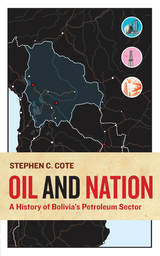
The book advances chronologically from Bolivia’s earliest petroleum pioneers in the nineteenth century until the present, inserting oil into historical debates about Bolivian ethnic, racial, and environmental issues, and within development strategies by different administrations. While Bolivia is best known for its tin mining, Oil and Nation makes the case that nationalist reformers viewed hydrocarbons and the state oil company as a way to modernize the country away from the tin monoculture and its powerful backers and toward an oil-powered future.

Colliding environmental and development interests have shaped national policy reforms supporting both oil development and environmental protection in Alaska. Oil and Wilderness in Alaska examines three significant national policy reform efforts that came out of these conflicts: the development of the Trans-Alaska pipeline, the establishment of a vast system of protected natural areas through the Alaska National Interest Lands Conservation Act, and the reform of the environmental management of the marine oil trade in Alaska to reduce the risk of oil pollution after the Exxon Valdez disaster.
Illuminating the delicate balance and give-and-take between environmental and commercial interests, as well as larger issues shaping policy reforms, Busenberg applies a theoretical framework to examine the processes and consequences of these reforms at the state, national, and international levels. The author examines the enduring institutional legacies and policy consequences of each reform period, their consequences for environmental protection, and the national and international repercussions of reform efforts. The author concludes by describing the continuing policy conflicts concerning oil development and nature conservation in Alaska left unresolved by these reforms. Rich case descriptions illustrate the author’s points and make this book an essential resource for professors and students interested in policies concerning Alaska, the Arctic, oil development, nature conservation, marine oil spills, the policy process, and policy theory.

A comprehensive challenge to prevailing understanding of international implications of oil wealth that shows why it can create bad actors
In a world where oil-rich states are more likely to start war than their oil-dependent counterparts, it’s surprising how little attention is still paid to these so-called petrostates. These states’ wealth props up the global arms trade, provides diplomatic leverage, and allows them to support violent and nonviolent proxies. In Oil, the State, and War, Emma Ashford explores the many potential links between domestic oil production and foreign policy behavior and how oil production influences global politics.
Not all petrostates have the same characteristics or capabilities. To help us conceptualize these differences, Ashford creates an original classification of three types of petrostates: oil-dependent states (those weakened by the resource curse), oil-wealthy states (those made rich by oil exports), and super-producer states (those that form the backbone of the global oil market). Through a combination of case studies and analysis, she illustrates how oil shapes petrostates’ behavior, filling a major gap in our understanding of the international implications of oil wealth. Experts have too often treated oil-rich states as passive objects, subject to the energy security needs of Western importing states. Instead, this book highlights the agency and power enjoyed by petrostates.
As the oil market undergoes a period of rapid change, Oil, the State, and War sheds light on the diversity of petrostates and how they shape international affairs.

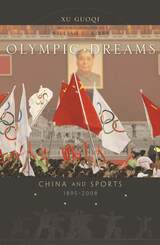
Already the world has seen the political, economic, and cultural significance of hosting the 2008 Olympics in Beijing—in policies instituted and altered, positions softened, projects undertaken. But will the Olympics make a lasting difference? This book approaches questions about the nature and future of China through the lens of sports—particularly as sports finds its utmost international expression in the Olympics.
Drawing on newly available archival sources to analyze a hundred-year perspective on sports in China, Olympic Dreams explores why the country became obsessed with Western sports at the turn of the twentieth century, and how it relates to China’s search for a national and international identity. Through case studies of ping-pong diplomacy and the Chinese handling of various sporting events, the book offers unexpected details and unusual insight into the patterns and processes of China’s foreign policymaking—insights that will help readers understand China’s interactions with the rest of the world.
Among the questions Xu Guoqi brings to the fore are: Why did Mao Zedong choose competitive ping-pong to manipulate world politics? How did the two-China issue nearly kill the 1976 Montreal Olympic Games? And why do the 2008 Olympics present Beijing with unprecedented dangers and opportunities? In exploring these questions, Xu brilliantly articulates a fresh and surprising perspective on China as an international sport superpower as well as a new “sick man of East Asia.” In Olympic Dreams, he presents an eloquent argument that in the deeply unsettled China of today, sport, as a focus of popular interest, has the capacity to bring about major social changes.
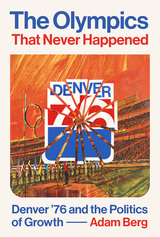
A look back at how powerful politicians, business leaders, and a diverse cast of activists used a thwarted Olympics to shape the state of Colorado and the city of Denver.
If you don’t recall the 1976 Denver Olympic Games, it’s because they never happened. The Mile-High City won the right to host the winter games and then was forced by Colorado citizens to back away from its successful Olympic bid through a statewide ballot initiative. Adam Berg details the powerful Colorado regime that gained the games for Denver and the grassroots activism that brought down its Olympic dreams, and he explores the legacy of this milestone moment for the games and politics in the United States.
The ink was hardly dry on Denver’s host agreement when Mexican American and African American urbanites, white middle-class environmentalists, and fiscally concerned local politicians realized opposition to the Olympics provided them new political openings. The Olympics quickly became a platform for taking stands on a range of issues, from conservation to urban livability to the very idea of growth, which for decades had been unquestioned in Colorado. The Olympics That Never Happened argues that hostility to the Olympics galvanized and empowered diverse citizens in a major US city, with long-term ramifications for Colorado and political activism elsewhere. The Olympics themselves were changed forever, compelling organizers to take seriously competing interests from subgroups within their communities.


On Petrocultures brings together key essays by Imre Szeman, a leading scholar in the field of energy humanities and a critical voice in debates about globalization and neoliberalism. Szeman’s most important and influential essays, in dialogue with exciting new pieces written for the book, investigate ever-evolving circuits of power in the contemporary world, as manifested in struggles over space and belonging, redefinitions of work and individual autonomy, and the deep links between energy use and climate change.
These essays explore life lived in the twenty-first century by examining critically the vocabulary through which capitalism makes sense of itself, focusing on concepts like the nation, globalization, neoliberalism, creativity, and entrepreneurship. At the heart of the volume is the concept of “petrocultures,” which demands that we understand a fundamental fact of modern life: we are shaped by and through fossil fuels. Szeman argues that we cannot take steps to address global warming without fundamentally changing the social, cultural, and political norms and expectations developed in conjunction with the energy riches of the past century. On Petrocultures maps the significant challenge of our dependence on fossil fuels and probes ways we might begin to leave petrocultures behind.
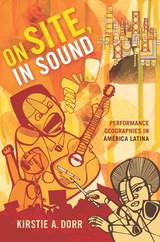
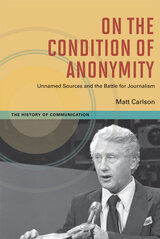

In sunbaked Terlingua, Texas (pop., a few hundred), residents joke that there is a musician under every rock. Located ten miles from Mexico in one of the remotest corners of the United States, the town had a recording studio before it had a school, a well-stocked grocery store, or even a water utility. Open jam sessions are a daily ritual, and some songwriters make a living from their craft despite being thousands of miles from New York or Nashville. Why does such a tiny and isolated place ring with singing and guitars?
Based on more than two years of on-the-ground research, On the Porch tells the story of this small but remarkable community. Chase Peeler invites us into the music, introducing us to a cast of characters as unique as the town itself. He reveals how novices and experts perform together—a rarity in contemporary America. He recounts the devastation brought on by a border closure and describes how music is once again uniting people across the Rio Grande. He considers the impact of gentrification in an off-the-grid paradise, and how this threatens to transform a precarious musical ecosystem. On the Porch is a celebration of human musicality, of the role that music plays and can play in our lives, both in Terlingua and beyond.

With enormous numbers of new immigrants, America is becoming dramatically more diverse racially, culturally, and ethnically. As a result, the United States faces questions that have profound consequences for its future. What does it mean to be an American? Is a new American identity developing? At the same time, the coherence of national culture has been challenged by the expansion of—and attacks on—individual and group rights, and by political leaders who prefer to finesse rather than engage cultural controversies. Many of the ideals on which the country was founded are under intense, often angry, debate, and the historic tension between individuality and community has never been felt so keenly.
In One America?, distinguished contributors discuss the role of national leadership, especially the presidency, at a time when a fragmented and dysfunctional national identity has become a real possibility. Holding political views that encompass the thoughtful left and right of center, they address fundamental issues such as affirmative action, presidential engagement in questions of race, dual citizenship, interracial relationships, and English as the basic language.
This book is the first examination of the role of national political leaders in maintaining or dissipating America’s national identity. It will be vital reading for political scientists, historians, policymakers, students, and anyone concerned with the future of American politics and society.

Abortion, affirmative action, the "right to die," pornography and free speech, homosexuality and sex discrimination: as eagerly as the Supreme Court's rulings on these hot issues are awaited and as intently as they're studied, they never seem to settle anything once and for all. But something is settled in the process--in the incremental approach--as Cass Sunstein shows us in this instructive book.
One of America's preeminent constitutional scholars, Sunstein mounts a defense of the most striking characteristic of modern constitutional law: the inclination to decide one case at a time. Examining various controversies, he shows how--and why--the Court has avoided broad rulings on issues from the legitimacy of affirmative action to the "right to die," and in doing so has fostered rather than foreclosed public debate on these difficult topics. He offers an original perspective on the right of free speech and the many novel questions raised by Congress's efforts to regulate violent and sexual materials on new media such as the Internet and cable television. And on the relationship between the Constitution and homosexuality and sex discrimination, he reveals how the Court has tried to ensure against second-class citizenship--and the public expression of contempt for anyone--while leaving a degree of flexibility to the political process.
One Case at a Time also lays out, and celebrates, the remarkable constellation of rights--involving both liberty and equality--that now commands a consensus in American law. An authoritative guide to the Supreme Court, the book offers a new understanding of the American Constitution, and of the relationship between democracy and constitutionalism, and between rights and self-government.
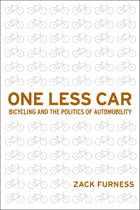
Although millions of people in the United States love to ride bicycles for exercise or leisure, statistics show that only 1% of the total U.S. population ride bicycles for transportation—and barely half as many use bikes to commute to work. In his original and exciting book, One Less Car, Zack Furness examines what it means historically, culturally, socioeconomically, and politically to be a bicycle transportation advocate/activist.
Presenting an underground subculture of bike enthusiasts who aggressively resist car culture, Furness maps out the cultural trajectories between mobility, technology, urban space and everyday life. He connects bicycling to radical politics, public demonstrations, alternative media production (e.g., ‘zines), as well as to the development of community programs throughout the world.
One Less Car also positions the bicycle as an object with which to analyze and critique some of the dominant cultural and political formations in the U.S.—and even breaks down barriers of race, class and gender privilege that are interconnected to mobility. For Furness, bicycles not only liberate people from technology, they also support social and environmental justice. So, he asks, Why aren’t more Americans adopting them for their transportation needs?
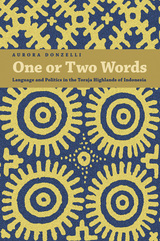
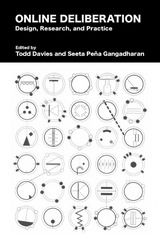
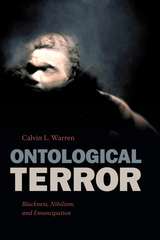
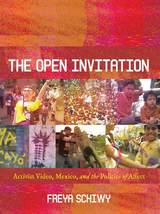
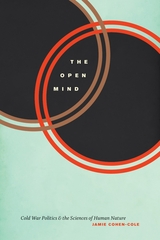
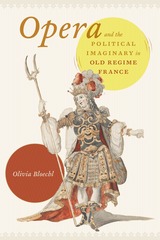
In Opera and the Political Imaginary in Old Regime France, however, Olivia Bloechl reveals another layer of French opera’s political theater. The make-believe worlds on stage, she shows, involved not just fantasies of sovereign rule but also aspects of government. Plot conflicts over public conduct, morality, security, and law thus appear side-by-side with tableaus hailing glorious majesty. What’s more, opera’s creators dispersed sovereign-like dignity and powers well beyond the genre’s larger-than-life rulers and gods, to its lovers, magicians, and artists. This speaks to the genre’s distinctive combination of a theological political vocabulary with a concern for mundane human capacities, which is explored here for the first time.
By looking at the political relations among opera characters and choruses in recurring scenes of mourning, confession, punishment, and pardoning, we can glimpse a collective political experience underlying, and sometimes working against, ancienrégime absolutism. Through this lens, French opera of the period emerges as a deeply conservative, yet also more politically nuanced, genre than previously thought.

Popular operas in late imperial China were a major part of daily entertainment, and were also important for transmitting knowledge of Chinese culture and values. In the twentieth century, however, Chinese operas went through significant changes. During the first four decades of the 1900s, led by Xin Wutai (New Stage) of Shanghai and Yisushe of Xi’an, theaters all over China experimented with both stage and scripts to present bold new plays centering on social reform. Operas became closely intertwined with social and political issues. This trend toward “politicization” was to become the most dominant theme of Chinese opera from the 1930s to the 1970s, when ideology-laden political plays reflected a radical revolutionary agenda.
Drawing upon a rich array of primary sources, this book focuses on the reformed operas staged in Shanghai and Xi’an. By presenting extensive information on both traditional/imperial China and revolutionary/Communist China, it reveals the implications of these “modern” operatic experiences and the changing features of Chinese operas throughout the past five centuries. Although the different genres of opera were watched by audiences from all walks of life, the foundations for opera’s omnipresence completely changed over time.
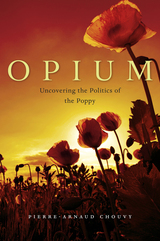
Known to the Greeks as opos or opion, as afiun in Persian and Arabic, and fuyung in Chinese, opium is at once a palliative and a poison. Its exotic origins, its literary associations, and the properties that are, often erroneously, attributed to it have ensured an ongoing air of mystery.
Pierre-Arnaud Chouvy reveals the long and fascinating history of a powerful and addictive drug and explores the changing fortunes of the modern-day illicit opium trade, especially in the remote regions of Asia. He answers key questions: Why have anti-drug policies failed despite four decades of increasing effort? And what are the shortcomings and limitations of forced eradication, alternative development, "silver bullets," and other quick fixes? In answering these questions, Chouvy draws upon geography, anthropology, politics, and development studies. He shows that the history of opium production is unexpectedly linked to the history of Afghanistan.
A compelling account of a narcotic as old as humanity, Opium offers powerful insights into the complex politics and economics of the poppy in the world today.
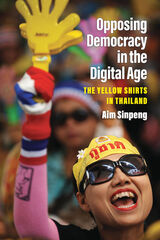
Opposing Democracy in the Digital Age is about why ordinary people in a democratizing state oppose democracy and how they leverage both traditional and social media to do so. Aim Sinpeng focuses on the people behind popular, large-scale antidemocratic movements that helped bring down democracy in 2006 and 2014 in Thailand. The yellow shirts (PAD—People’s Alliance for Democracy) that are the focus of the book are antidemocratic movements grown out of democratic periods in Thailand, but became the catalyst for the country’s democratic breakdown. Why, when, and how supporters of these movements mobilize offline and online to bring down democracy are some of the key questions that Sinpeng answers. While the book primarily uses a qualitative methodological approach, it also uses several quantitative tools to analyze social media data in the later chapters. This is one of few studies in the field of regime transition that focuses on antidemocratic mobilization and takes the role of social media seriously.
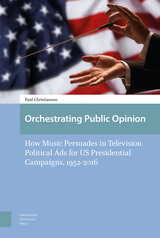
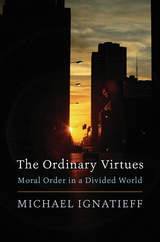
Winner of the Zócalo Book Prize
A New York Times Book Review Editors’ Choice
“Combines powerful moral arguments with superb storytelling.”
—New Statesman
What moral values do we hold in common? As globalization draws us together economically, are the things we value converging or diverging? These twin questions led Michael Ignatieff to embark on a three-year, eight-nation journey in search of an answer. What we share, he found, are what he calls “ordinary virtues”: tolerance, forgiveness, trust, and resilience. When conflicts break out, these virtues are easily exploited by the politics of fear and exclusion, reserved for one’s own group but denied to others. Yet these ordinary virtues are the key to healing and reconciliation on both a local and global scale.
“Makes for illuminating reading.”
—Simon Winchester, New York Review of Books
“Engaging, articulate and richly descriptive… Ignatieff’s deft histories, vivid sketches and fascinating interviews are the soul of this important book.”
—Times Literary Supplement
“Deserves praise for wrestling with the devolution of our moral worlds over recent decades.”
—Los Angeles Review of Books
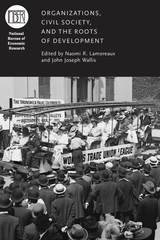
The contributions to Organizations, Civil Society, and the Roots of Development seek to answer this question through an exploration of how developing nations throughout the eighteenth and nineteenth centuries, including the United States, United Kingdom, France, and Germany, made the transition to allowing their citizens the right to form organizations. The transition, contributors show, was not an easy one. Neither political changes brought about by revolution nor subsequent economic growth led directly to open access. In fact, initial patterns of change were in the opposite direction, as political coalitions restricted access to specific organizations for the purpose of maintaining political control. Ultimately, however, it became clear that these restrictions threatened the foundation of social and political order. Tracing the path of these modern civil societies, Organizations, Civil Society, and the Roots of Development is an invaluable contribution to all interested in today’s developing countries and the challenges they face in developing this organizational capacity.
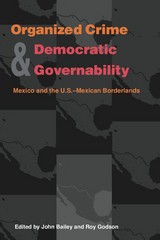
The United States–Mexico border zone is one of the busiest and most dangerous in the world. NAFTA and rapid industrialization on the Mexican side have brought trade, travel, migration, and consequently, organized crime and corruption to the region on an unprecedented scale. Until recently, crime at the border was viewed as a local law enforcement problem with drug trafficking—a matter of “beefing” up police and “hardening” the border. At the turn of the century, that limited perception has changed.
The range of criminal activity at the border now extends beyond drugs to include smuggling of arms, people, vehicles, financial instruments, environmentally dangerous substances, endangered species, and archeological objects. Such widespread trafficking involves complex, high-level criminal-political alliances that local lawenforcement alone can’t address. Researchers of the region, as well as officials from both capitals, now see the border as a set of systemic problems that threaten the economic, political, and social health of their countries as a whole.
Organized Crime and Democratic Governability brings together scholars and specialists, including current and former government officials, from both sides of the border to trace the history and define the reality of this situation. Their diverse perspectives place the issue of organized crime in historical, political, economic, and cultural contexts unattainable by single-author studies. Contributors examine broad issues related to the political systems of both countries, as well as the specific actors—crime gangs, government officials, prosecutors, police, and the military—involved in the ongoing drama of the border. Editors Bailey and Godson provide an interpretive frame, a “continuum of governability,” that will guide researchers and policymakers toward defining goals and solutions to the complex problem that, along with a border, the United States and Mexico now share.
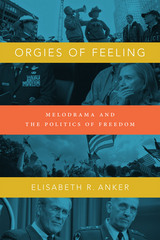
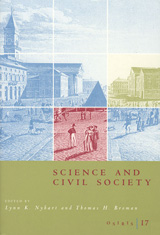
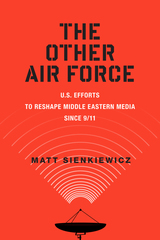
As it seeks to win the hearts and minds of citizens in the Muslim world, the United States has poured millions of dollars into local television and radio programming, hoping to generate pro-American currents on Middle Eastern airwaves. However, as this fascinating new book shows, the Middle Eastern media producers who rely on these funds are hardly puppets on an American string, but instead contribute their own political and creative agendas while working within U.S. restrictions.
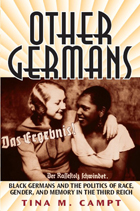
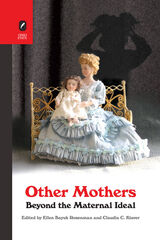
This collection addresses this void, revealing the extraordinary diversity of Victorian motherhood. Exploring diaries, novels, and court cases, with contexts ranging from London to Egypt to Australia, these varied accounts take the collection “beyond the maternal ideal” to consider the multiple, unpredictable ways in which motherhood was experienced and imagined in this formative historical period.
Other Mothers joins revisionist approaches to femininity that now characterize Victorian studies. Its contents trace intersections among gender, race, and class; question the power of separate spheres ideology; and insist on the context-specific nature of social roles. The fifteen essays in this volume contribute to the fields of literary criticism, history, cultural studies, and history.
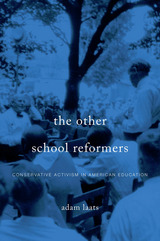
The idea that American education has been steered by progressive values is celebrated by liberals and deplored by conservatives, but both sides accept it as fact. Adam Laats shows that this widely held belief is simply wrong. Upending the standard narrative of American education as the product of courageous progressive reformers, he calls to center stage the conservative activists who decisively shaped America’s classrooms in the twentieth century. The Other School Reformers makes clear that, in the long march of American public education, progressive reform has more often been a beleaguered dream than an insuperable force.
Laats takes an in-depth look at four landmark school battles: the 1925 Scopes Trial, the 1939 Rugg textbook controversy, the 1950 ouster of Pasadena Public Schools Superintendent Willard Goslin, and the 1974 Kanawha County school boycott. Focused on issues ranging from evolution to the role of religion in education to the correct interpretation of American history, these four highly publicized controversies forced conservatives to articulate their vision of public schooling—a vision that would keep traditional Protestant beliefs in America’s classrooms and push out subversive subjects like Darwinism, socialism, multiculturalism, and feminism. As Laats makes clear in case after case, activists such as Hiram Evans and Norma Gabler, Homer Chaillaux and Louise Padelford were fiercely committed to a view of the curriculum that inculcated love of country, reinforced traditional gender roles and family structures, allowed no alternatives to capitalism, and granted religion a central role in civic life.

A necessary, rich new examination of how the wired world affects our humanity
Our tech-fueled economy is often touted as a boon for the development of our fullest human potential. But as our interactions are increasingly turned into mountains of data sifted by algorithms, what impact does this infinite accumulation and circulation of information really have on us? What are the hidden mechanisms that drive our continuous engagement with the digital?
In The Other Side of the Digital, Andrea Righi argues that the Other of the digital acts as a new secular God, exerting its power through endless accountability that forces us to sacrifice ourselves for the digital. Righi deconstructs the contradictions inherent in our digital world, examining how ideas of knowledge, desire, writing, temporality, and the woman are being reconfigured by our sacrificial economy. His analyses include how both our self-image and our perception of reality are skewed by technologies like fitness bands, matchmaking apps, and search engines, among others.
The Other Side of the Digital provides a necessary, in-depth cultural analysis of how the political theology of the new media functions under neoliberalism. Drawing on the work of well-known thinkers like Jacques Derrida, Jacques Lacan, and Ludwig Wittgenstein, as well as Carla Lonzi, Luisa Muraro, and Luciano Parinetto, Righi creates novel appraisals of popular digital tools that we now use routinely to process life experiences. Asking why we must sign up for this sort of regime, The Other Side of the Digital is an important wake-up call to a world deeply entangled with the digital.
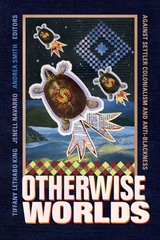
Contributors
Maile Arvin, Marcus Briggs-Cloud, J. Kameron Carter, Ashon Crawley, Denise Ferreira da Silva, Chris Finley, Hotvlkuce Harjo, Sandra Harvey, Chad B. Infante, Tiffany Lethabo King, Jenell Navarro, Lindsay Nixon, Kimberly Robertson, Jared Sexton, Andrea Smith, Cedric Sunray, Se’mana Thompson, Frank B. Wilderson
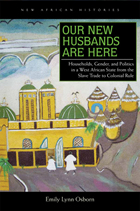
In Our New Husbands Are Here, Emily Lynn Osborn investigates a central puzzle of power and politics in West African history: Why do women figure frequently in the political narratives of the precolonial period, and then vanish altogether with colonization? Osborn addresses this question by exploring the relationship of the household to the state. By analyzing the history of statecraft in the interior savannas of West Africa (in present-day Guinea-Conakry), Osborn shows that the household, and women within it, played a critical role in the pacifist Islamic state of Kankan-Baté, enabling it to endure the predations of the transatlantic slave trade and become a major trading center in the nineteenth century. But French colonization introduced a radical new method of statecraft to the region, one that separated the household from the state and depoliticized women’s domestic roles. This book will be of interest to scholars of politics, gender, the household, slavery, and Islam in African history.
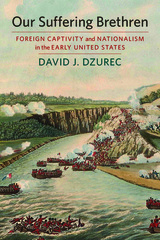
Drawing on newspaper accounts, prisoner narratives, and government records, David J. Dzurec III explores how stories of American captivity in North America, Europe, and Africa played a critical role in the development of American political culture, adding a new layer to our understanding of foreign relations and domestic politics in the early American republic.
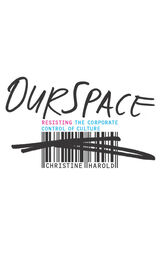
When reporters asked about the Bush administration’s timing in making their case for the Iraq war, then Chief of Staff Andrew Card responded that “from an marketing point of view, you don’t introduce new products in August.” While surprising only in its candor, this statement signified the extent to which consumer culture has pervaded every aspect of life. For those troubled by the long reach of the marketplace, resistance can seem futile. However, a new generation of progressive activists has begun to combat the media supremacy of multinational corporations by using the very tools and techniques employed by their adversaries.
In OurSpace, Christine Harold examines the deployment and limitations of “culture jamming” by activists. These techniques defy repressive corporate culture through parodies, hoaxes, and pranks. Among the examples of sabotage she analyzes are the magazine Adbusters’ spoofs of familiar ads and the Yes Men’s impersonations of company spokespersons.
While these strategies are appealing, Harold argues that they are severely limited in their ability to challenge capitalism. Indeed, many of these tactics have already been appropriated by corporate marketers to create an aura of authenticity and to sell even more products. For Harold, it is a different type of opposition that offers a genuine alternative to corporate consumerism. Exploring the revolutionary Creative Commons movement, copyleft, and open source technology, she advocates a more inclusive approach to intellectual property that invites innovation and wider participation in the creative process.
From switching the digital voice boxes of Barbie dolls and G.I. Joe action figures to inserting the silhouetted image of Abu Ghraib’s iconic hooded and wired victim into Apple’s iPod ads, high-profile instances of anticorporate activism over the past decade have challenged, but not toppled, corporate media domination. OurSpace makes the case for a provocative new approach by co-opting the logic of capitalism itself.
Christine Harold is assistant professor of speech communication at the University of Georgia.
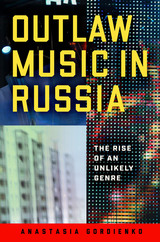
The Russian shanson can be heard across the country today, on radio and television shows, at mass events like political rallies, and even at the Kremlin. Yet despite its ubiquity, it has attracted almost no scholarly attention. Anastasia Gordienko provides the first full history of the shanson, from its tenuous ties to early modern criminals’ and robbers’ folk songs, through its immediate generic predecessors in the Soviet Union, to its current incarnation as the soundtrack for daily life in Russia. It is difficult to firmly define the shanson or its family of song genres, but they all have some connection, whether explicit or implicit, to the criminal underworld or to groups or activities otherwise considered subversive. Traditionally produced by and popular among criminals and other marginalized groups, and often marked by characters and themes valorizing illegal activities, the songs have undergone censorship since the early nineteenth century. Technically legal only since the collapse of the Soviet Union, the shanson is today not only broadly popular but also legitimized by Vladimir Putin’s open endorsement of the genre.
With careful research and incisive analysis, Gordienko deftly details the shanson’s history, development, and social meanings. Attempts by imperial rulers, and later by Soviet leaders, to repress the songs and the lifestyles they romanticized not only did little to discourage their popularity but occasionally helped the genre flourish. Criminals and liberal intelligentsia mingled in the Gulag system, for instance, and this contact introduced censored songs to an educated, disaffected populace that inscribed its own interpretations and became a major point of wider dissemination after the Gulag camps were closed. Gordienko also investigates the shanson as it exists in popular culture today: not divorced from its criminal undertones (or overtones) but celebrated for them. She argues that the shanson expresses fundamental themes of Russian culture, allowing for the articulation of anxieties, hopes, and dissatisfactions that are discouraged or explicitly forbidden otherwise.
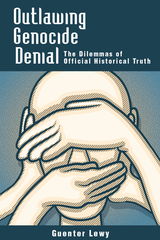
Holocaust denial can be viewed as another form of hatred against the Jews and preventing it can be understood as a form of warding off hate speech. Germany has made it a crime punishable by law. Other European countries have similar laws. While the rationale for such laws seems reasonable, Lewy asks readers to look again and to consider carefully the dangers that these laws could present. His discussion neither dismisses the ramifications of genocide denial nor justifies it; he instead looks closely at the possible risks of government-enforced interpretations of history.
Outlawing genocide denial sets a precedent of allowing governments to dictate historical truth and how events should be interpreted. Such government restrictions can be counterproductive in a democratic society which values freedom of speech. Lewy examines these and related ideas through the analysis of historical and current examples. He posits his own conclusion but leaves it up to readers to view the evidence and arguments and form their own opinions.
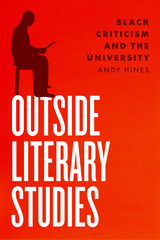
This striking contribution to Black literary studies examines the practices of Black writers in the mid-twentieth century to revise our understanding of the institutionalization of literary studies in America. Andy Hines uncovers a vibrant history of interpretive resistance to university-based New Criticism by Black writers of the American left. These include well-known figures such as Langston Hughes and Lorraine Hansberry as well as still underappreciated writers like Melvin B. Tolson and Doxey Wilkerson. In their critical practice, these and other Black writers levied their critique from “outside” venues: behind the closed doors of the Senate Permanent Subcommittee on Investigations, in the classroom at a communist labor school under FBI surveillance, and in a host of journals. From these vantages, Black writers not only called out the racist assumptions of the New Criticism, but also defined Black literary and interpretive practices to support communist and other radical world-making efforts in the mid-twentieth century. Hines’s book thus offers a number of urgent contributions to literary studies: it spotlights a canon of Black literary texts that belong to an important era of anti-racist struggle, and it fills in the pre-history of the rise of Black studies and of ongoing Black dissent against the neoliberal university.
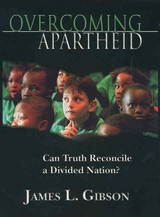
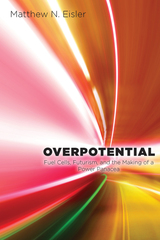
It sounds so simple. Just combine oxygen and hydrogen in an electrochemical reaction that produces water and electricity, and you’ll have a clean, efficient power source. But scientists have spent decades—and billions of dollars in government and industry funding—developing the fuel cell. There have been successes and serendipitous discoveries along the way, but engineering a fuel cell that is both durable and affordable has proved extraordinarily difficult.
Overpotential charts the twists and turns in the ongoing quest to create the perfect fuel cell. By exploring the gap between the theory and practice of fuel cell power, Matthew N. Eisler opens a window into broader issues in the history of science, technology, and society after the Second World War, including the sociology of laboratory life, the relationship between academe, industry, and government in developing advanced technologies, the role of technology in environmental and pollution politics, and the rise of utopian discourse in science and engineering.

In the run-up to the 2003 invasion of Iraq, a fair number of Americans thought the idea was crazy. Now everyone, except a few die-hards, thinks it was. So what was going through the minds of the talented and experienced men and women who planned and initiated the war? What were their assumptions? Overreach aims to recover those presuppositions.
Michael MacDonald examines the standard hypotheses for the decision to attack, showing them to be either wrong or of secondary importance: the personality of President George W. Bush, including his relationship with his father; Republican electoral considerations; the oil lobby; the Israeli lobby. He also undermines the argument that the war failed because of the Bush administration’s incompetence.
The more fundamental reasons for the Iraq War and its failure, MacDonald argues, are located in basic axioms of American foreign policy, which equate America’s ideals with its interests (distorting both in the process) and project those ideals as universally applicable. Believing that democratic principles would bring order to Iraq naturally and spontaneously, regardless of the region’s history and culture or what Iraqis themselves wanted, neoconservative thinkers, with support from many on the left, advocated breaking the back of state power under Saddam Hussein. They maintained that by bringing about radical regime change, the United States was promoting liberalism, capitalism, and democracy in Iraq. But what it did instead was unleash chaos.
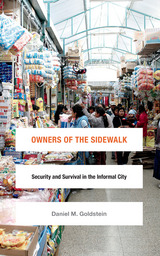
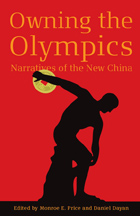
"A major contribution to the study of global events in times of global media. Owning the Olympics tests the possibilities and limits of the concept of 'media events' by analyzing the mega-event of the information age: the Beijing Olympics. . . . A good read from cover to cover."
—Guobin Yang, Associate Professor, Asian/Middle Eastern Cultures & Sociology, Barnard College, Columbia University
From the moment they were announced, the Beijing Games were a major media event and the focus of intense scrutiny and speculation. In contrast to earlier such events, however, the Beijing Games are also unfolding in a newly volatile global media environment that is no longer monopolized by broadcast media. The dramatic expansion of media outlets and the growth of mobile communications technology have changed the nature of media events, making it significantly more difficult to regulate them or control their meaning. This volatility is reflected in the multiple, well-publicized controversies characterizing the run-up to Beijing 2008. According to many Western commentators, the People's Republic of China seized the Olympics as an opportunity to reinvent itself as the "New China"---a global leader in economics, technology, and environmental issues, with an improving human-rights record. But China's maneuverings have also been hotly contested by diverse global voices, including prominent human-rights advocates, all seeking to displace the official story of the Games.
Bringing together a distinguished group of scholars from Chinese studies, human rights, media studies, law, and other fields, Owning the Olympics reveals how multiple entities---including the Chinese Communist Party itself---seek to influence and control the narratives through which the Beijing Games will be understood.
digitalculturebooks is an imprint of the University of Michigan Press and the Scholarly Publishing Office of the University of Michigan Library dedicated to publishing innovative and accessible work exploring new media and their impact on society, culture, and scholarly communication. Visit the website at www.digitalculture.org.
READERS
Browse our collection.
PUBLISHERS
See BiblioVault's publisher services.
STUDENT SERVICES
Files for college accessibility offices.
UChicago Accessibility Resources
home | accessibility | search | about | contact us
BiblioVault ® 2001 - 2024
The University of Chicago Press









